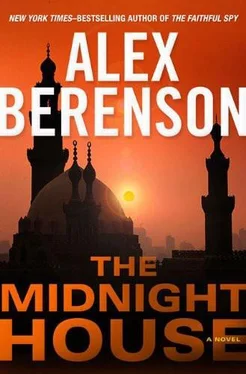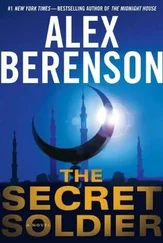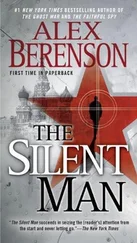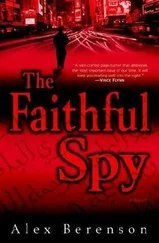Alex Berenson - The Midnight House
Здесь есть возможность читать онлайн «Alex Berenson - The Midnight House» весь текст электронной книги совершенно бесплатно (целиком полную версию без сокращений). В некоторых случаях можно слушать аудио, скачать через торрент в формате fb2 и присутствует краткое содержание. Жанр: Шпионский детектив, на английском языке. Описание произведения, (предисловие) а так же отзывы посетителей доступны на портале библиотеки ЛибКат.
- Название:The Midnight House
- Автор:
- Жанр:
- Год:неизвестен
- ISBN:нет данных
- Рейтинг книги:3 / 5. Голосов: 1
-
Избранное:Добавить в избранное
- Отзывы:
-
Ваша оценка:
- 60
- 1
- 2
- 3
- 4
- 5
The Midnight House: краткое содержание, описание и аннотация
Предлагаем к чтению аннотацию, описание, краткое содержание или предисловие (зависит от того, что написал сам автор книги «The Midnight House»). Если вы не нашли необходимую информацию о книге — напишите в комментариях, мы постараемся отыскать её.
The Midnight House — читать онлайн бесплатно полную книгу (весь текст) целиком
Ниже представлен текст книги, разбитый по страницам. Система сохранения места последней прочитанной страницы, позволяет с удобством читать онлайн бесплатно книгу «The Midnight House», без необходимости каждый раз заново искать на чём Вы остановились. Поставьте закладку, и сможете в любой момент перейти на страницу, на которой закончили чтение.
Интервал:
Закладка:
“Adventure,” the imam said.
“Kuwait, it’s boring. Office buildings, oil wells, desert. These boys have nothing to do but drive around all day. Not even a wife, unless they’re rich. The sheikhs take three, four women each, and there’s none for the rest of us. With the Talibs, they can fire AKs, throw a grenade. Pretend they’re soldiers.”
“You don’t have children.”
“I’m not a sheikh. I didn’t have the money to marry. Anyway, Ali, the Americans caught him in Afghanistan and kept him for two years. Finally, they released him. When he came back, he told me how they kept him in a little cage. I think it made him crazy. He was so angry. At the Americans, the Kuwaitis, his own family.”
“He was like that before he went to Afghanistan?”
“No. He was a regular boy. But once he came back to Kuwait, he wasn’t anymore. He only ever talked of martyrdom. And then he disappeared. I found out later, he went to Iraq, became a fedayeen”—a martyr.
“A bomber.”
“Yes. He killed himself outside a police station in Baghdad. Thirteen police died. And after that, I had the idea for these interviews. So that everyone will know what the Americans are doing. I know about computers and filming. But it isn’t easy to find the men, or get them to talk. They may be home, but they aren’t free. They know our police are working with the Americans and don’t want to be embarrassed. And lots of them are just—” Wells spread his hands out, meaning disappeared . Then winced as his shoulder caught fire again.
“You should go to Saudi.”
“In Saudi the mukhabarat are too good.” Wells paused. “And your son, there’s something else, another reason I want to talk to him. I heard he wasn’t a jihadi at all. Just a man who wanted to set up a cell-phone business. An innocent.”
“You heard this? Who told you?”
“People see the videos, the Web site, and they e-mail me. Most of the time I can’t confirm what they say. But this time I found someone who could.”
“Who?”
“I can’t tell you.”
“Then I can’t help you.”
Wells looked to the imam. “It is best for all of us if I’m the only one who knows. For the same reason you took these precautions to pick me up.”
“And my son’s story—”
“He tells whatever he likes, as much or as little. I protect him, hide his face. Show just enough of him that people know he’s real. The video takes one, two hours to make. Three at most, if your son has a lot to tell. I send it to the Web site, and you never see me again.”
And along the way I’ll find out if he knows anything about the murders, Wells thought.
“Even if I wanted to help, I don’t know where he is,” Zumari said.
“But you can reach him.”
“I can try.”
“Then please try.”
They were silent as the truck rumbled on. Hani dialed his phone, spoke so quietly that Wells couldn’t hear.
“Do you have anything else to tell us? ” the imam said.
“No.”
The truck slowed, then stopped.
“Kuwaiti,” the imam said. “Your shoulder is all right?”
“I think so, yes.”
The imam handed Wells his passport and wallet. “Then this is where we leave you. There’s a ramp ahead. Take it down, go back to your hotel. Stay away from my house”—the mosque. “If we need to see you again, we will find you.”
“I’m sure,” Wells said. “I ask only this: whatever you decide—” Wells broke off.
“Yes?”
“Decide soon. It will be safer for all of us.”
An air horn blasted through the cargo compartment. Hani pulled up the back gate of the truck. Wells saw they were on a highway, the traffic piling up behind them.
“Ma-a-saalama,” he said to Ihab and the imam. Peace be with you. Good-bye.
“Ma-a-saalama,” they said in turn. Wells jumped out the back of the truck. A wave of dizziness hit him and his knees buckled, but he stayed upright. Behind him, the truck rumbled off. He didn’t turn to watch it go.
He found himself on an elevated highway, staring east, into the rising sun. To the north and south were endless zigzag blocks of misshapen concrete buildings. Many seemed unfinished, their roofs turned into dumps filled with half-melted tires and lumpy plastic bags of garbage. He must still be in Cairo, somewhere on the ring road that had once marked the outer edges of the city.
A Mercedes sedan nearly knocked him over. He turned to look for the exit ramp — and saw, looming over the city on a plateau to the west, the three great pyramids, just beginning to reflect the glow of the morning sun. Wells understood immediately why European adventurers had thought that they’d been built by aliens. They were immense, so much larger than the buildings around them that they seemed to be governed by entirely different laws of physics. Wells stared at them until a honk brought him back to the highway. He walked slowly down the ramp until the city swallowed up him and the pyramids.
HEADING BACK to the hotel, Wells saw the scope of the city at last. Close to twenty million people lived in Cairo, though no one, not even the Egyptian government, knew exactly how many. The shabby concrete and brick buildings went on block after block, mile after mile, unrelieved by parks or gardens or even palm trees. The place was overwhelming, ugly, primordial, Los Angeles without highways, Rio without the ocean. Year after year it had grown east and west into the desert and south along the Nile, swallowing every settlement in its path.
Wells had seen only one other city as big and dense, as noisy and smoggy: Beijing. But in Beijing the hand of the Chinese state touched every alley and dumpling stand. Beijing was order disguised as chaos. Not Cairo. Cairo was chaos, undisguised. Cairo lacked any organizing principle. Except Islam.
A minivan pulled in front of them, and the cabbie banged his brakes to avoid a collision. Wells stifled a groan as the seat belt grabbed his shoulder. The van, improbably enough, seemed to have a load of goats as passengers.
Suddenly, Wells badly wanted to find his way to the Intercontinental for air-conditioning, a hot shower, and a cold beer. He reminded himself that he’d spent a decade living without any of the three. No, he would go back to the Lotus, where he belonged. And as the traffic inched forward, he smiled to himself. The mukhabarat, the jihadis — he was back in the game.
7
The Counterterrorist Center was the CIA’s fastest-growing unit. To make room for it, the agency had built offices in a subterranean maze carved from the foundations of the New Headquarters Building. The fight against Al Qaeda ate a disproportionate share of the agency’s budget, so the new space had bells and whistles the rest of the CIA lacked: flat-panel screens, dedicated teraflop-speed connections to the National Security Agency and Department of Defense, and videoconferencing equipment capable of projecting in three dimensions. Somewhere, Osama bin Laden was quaking in his boots.
Or not.
Brant Murphy met Shafer at the main entrance to CTC, a miniature version of the agency’s main lobby, two guards overseeing a bank of turnstiles. The official logic behind the secondary checkpoint was that CTC needed extra security because it so frequently hosted visitors from other federal agencies and foreign spy services. In reality, the second guard post was further proof that the unit held itself apart from the rest of the agency.
Murphy was handsome and compact, with deep blue eyes and close-cropped blond hair that had lost its grip on his temples and was fighting a rearguard action against its inevitable fate as a widow’s peak. He had a firm two-pump handshake, friendly but manly. Shafer couldn’t understand how Murphy had ended up with 673. Spending a year-plus in Poland interrogating detainees didn’t seem like his idea of a great time.
Читать дальшеИнтервал:
Закладка:
Похожие книги на «The Midnight House»
Представляем Вашему вниманию похожие книги на «The Midnight House» списком для выбора. Мы отобрали схожую по названию и смыслу литературу в надежде предоставить читателям больше вариантов отыскать новые, интересные, ещё непрочитанные произведения.
Обсуждение, отзывы о книге «The Midnight House» и просто собственные мнения читателей. Оставьте ваши комментарии, напишите, что Вы думаете о произведении, его смысле или главных героях. Укажите что конкретно понравилось, а что нет, и почему Вы так считаете.












